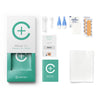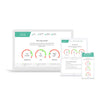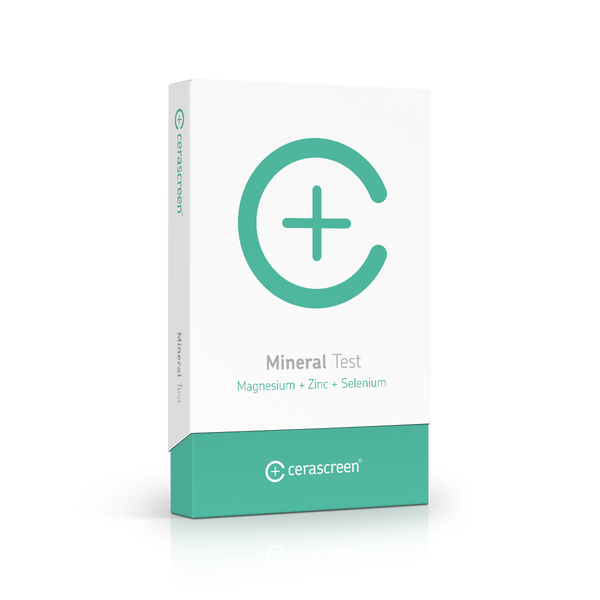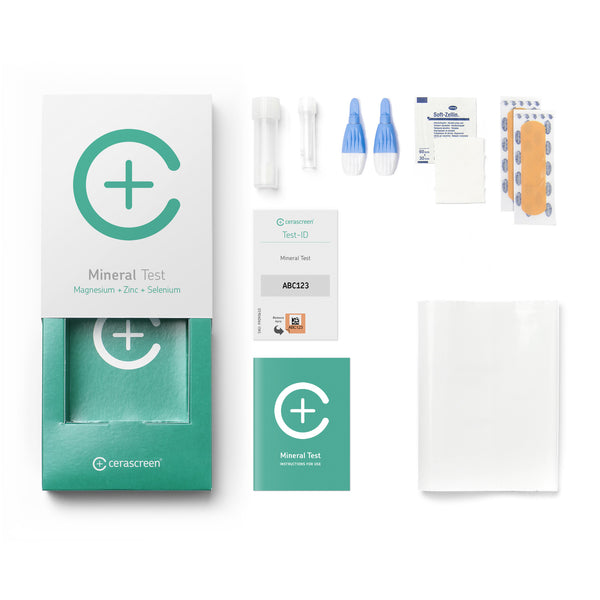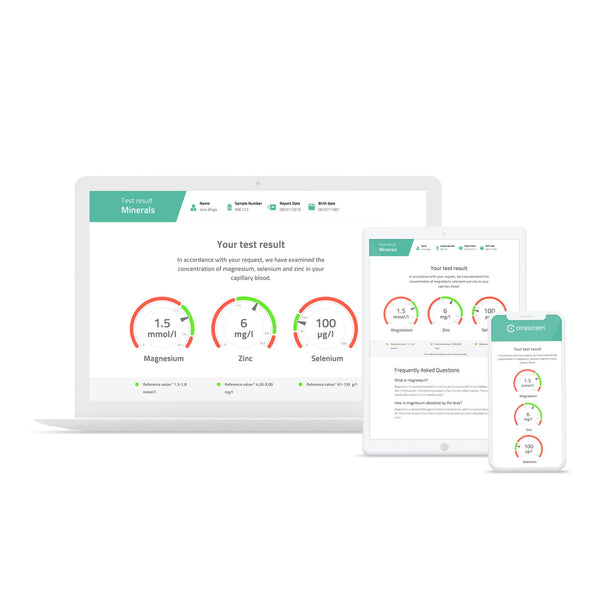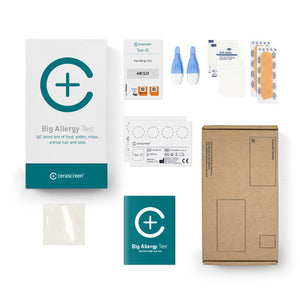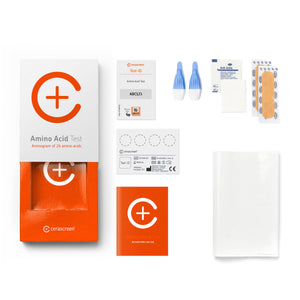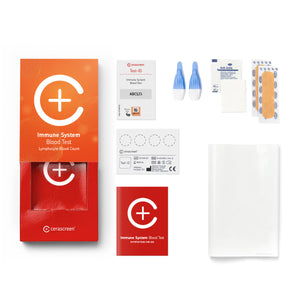product_id = 1690287505467variant_id = template_name =
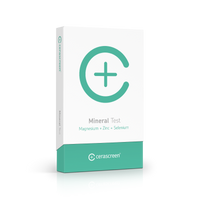
Mineral Test
Magnesium + Zinc + Selenium
About the test
Magnesium, selenium and zinc are minerals vital for your physical and mental fitness. A deficiency can have serious consequences – such as a weakened immune system. The cerascreen® Mineral Test helps you find out quickly and easily whether your body lacks these minerals.
The cerascreen® Mineral Test is a sample-taking mail-in kit that determines the levels of magnesium, zinc and selenium in your blood. Take the sample conveniently and easily at home! The sample of human capillary blood will then be analysed in vitro in one of our certified medical partner laboratories. Receive your mineral levels test results within seven to nine business days after your sample has arrived in the laboratory.
Benefits of the Mineral Test
Tiredness, headaches, depressive moods, constant infection – these are some of the symptoms that can occur with magnesium deficiency, zinc deficiency or selenium deficiency. If you optimise these nutrient levels, you will promote a healthy immune system, skin and hair, better physical and mental performance and optimal regeneration.
Our food contains fewer and fewer minerals – one of the reasons for this is climate change, which affects the mineral content of plants and animals. Therefore, even with a balanced diet, it is not always possible to supply your body with enough of the magnesium, selenium and zinc that it needs.
Benefit from our expertise: cerascreen® is the market leader for medical sample collection and sending kits in Europe, with eight years of experience in the development and analysis of tests. We have developed more than 50 approved send-in test kits (medical devices), analysed 250,000 samples and serve 19 countries.

Result of the Mineral Test
As soon as your sample has been analysed, you will receive your results report via the My cerascreen® app or by logging in to your account on our website. You can easily view the report on your smartphone, tablet or computer, and print it out, if required.Find out your blood levels of the minerals zinc, magnesium and selenium in the laboratory analysis. Learn how to optimise mineral levels that are too low or too high through our clear recommendations. Learn more about the effects and intake of zinc, magnesium and selenium with the comprehensive health information we give you.
Frequently asked questions about Mineral Test
Why are minerals important?
The mineral test tells you how optimal your magnesium, selenium and zinc levels are. All three are essential trace elements – that is, nutrients with which you need to supply your body externally through your diet.
If you develop a magnesium deficiency, selenium deficiency or zinc deficiency, it can have a negative impact on your health – from constant fatigue and muscle weakness to the risk of developing cardiovascular disease, kidney, liver or thyroid problems or other illnesses.
An excess of magnesium, selenium or zinc also poses health risks.
However, it is difficult to pinpoint the exact connection between symptoms, eating habits and mineral deficiency in everyday life. A blood test can help by measuring the concentration of minerals in your blood.
Who should take the mineral test?
Since magnesium deficiency, selenium deficiency and zinc deficiency do not manifest themselves through clear symptoms, it can be worthwhile for everyone to test their own mineral levels.
In general, people who eat a rather unbalanced diet and suffer from intestinal diseases or other digestive problems are at a higher risk of such mineral deficiencies.
In addition, there are certain risk groups and risk factors for mineral deficiencies:
Magnesium deficiency: competitive athletes, menopausal women, pregnant and breastfeeding women, people who regularly take antibiotics, birth control pills or proton pump inhibitors.
Selenium deficiency: Smokers, alcoholics and people who need dialysis, as a lot of selenium is lost in the process.
Zinc deficiency: vegans and vegetarians, people who suffer from stress or who do a lot of sport, especially in summer.
How does the Mineral Test work?
For the mineral test, you take a small blood sample from your fingertip with a lancet. The sample is sent in a tube via a return envelope to a specialist diagnostic laboratory.
The diagnostic laboratory then analyses the concentration of the minerals magnesium, selenium and zinc in your blood.
How long does the analysis take in the laboratory?
Once your sample has arrived at the laboratory, it will be analyzed there by specialists. How long the analysis takes depends on the exact measuring method and the processes in the laboratory.
If the sample is sent on the correct days (Sunday to Tuesday), this makes it easier for the laboratory to adhere to the times.
For the Mineral Test, the laboratory analysis is usually completed within 10 working days after the sample is received in the laboratory.
What will the test results tell me?
The detailed results report contains the results of the laboratory analysis. You will find out how high the concentration of the minerals is in your blood:
- Zinc in millimoles per litre (mmol/l)
- Selenium in micrograms per litre (μg/l)
- Magnesium in milligrams per litre (mg/l)
You will receive reference values with which you can compare your mineral concentrations to give you a better idea of what they should ideally be.
The report also provides you with valuable information about the three minerals and gives you clear recommendations with which you can optimise your levels with a balanced diet and food supplements.
What is a magnesium deficiency?
Magnesium is involved in numerous processes in the body. These include the function of muscles and nerves, the formation of bones and teeth and regular heart function.
Competitive athletes need more magnesium, as do menopausal women, pregnant and breastfeeding women and people with alcoholism. These groups are more likely to develop a magnesium deficiency if they do not adjust their diet.
Magnesium deficiency can cause muscle cramps, fatigue, poor performance, difficulty concentrating, headaches, and tingling and numbness, among other symptoms. In the long run, cardiovascular diseases and kidney problems can become more likely.
How can I optimise my magnesium intake?
Magnesium is mainly found in plant-based foods, in fruit, vegetables and wholegrain products. Pumpkin and sunflower seeds, quinoa and oat flakes are very rich in magnesium. We also consume a large part of our daily requirement through liquids, such as mineral water, coffee and tea. If you have confirmed a deficiency, you can also take magnesium supplements.
What is a selenium deficiency?
Selenium forms important proteins in the body. It strengthens the immune system and protects cells from damage. It also supports the function of vitamins, thyroid hormones and sperm formation, among other things.
Selenium deficiency is more common in heavy smokers and alcoholics, in women who breastfeed for a long time and in people with intestinal diseases.
Selenium deficiency symptoms include, among other things, fatigue, muscle weakness, decreased immune function and depressive moods.
What are sources of selenium?
Selenium is found in plant-based and animal foods – especially in coconuts and Brazil nuts. The exact selenium content depends on how selenium-rich the soil is in which a food was grown. With climate change, selenium content in many soils is decreasing, which in turn means that our food contains less selenium.
If you take selenium supplements, you should make sure you don’t exceed an amount of 45 milligrammes per day.
What is a zinc deficiency?
Among other things, zinc is important for a strong immune system, skin and hair growth and rapid wound healing. In addition, zinc, together with selenium, protects the body from damage caused by toxic heavy metals.
A zinc deficiency can be caused by very intense sports, among other things, as you lose zinc through sweating. Vegans and vegetarians and people with chronic inflammatory bowel diseases are also at a greater risk of zinc deficiency.
Symptoms for this deficiency include hair loss, loss of appetite, diarrhoea, muscle cramps and slow wound healing.
How can I optimise my zinc intake?
Zinc is found in a wide variety of foods – in large quantities, for example, in oysters, cheese, eggs, offal and sunflower seeds, and to a lesser extent in cereals, nuts and pulses.
However, your body can absorb zinc from animal foods much better than from plant-based foods. If you have a confirmed zinc deficiency, you can also take zinc supplements. The best supplements are those in which zinc is found in compounds such as zinc histidine, which the body can utilise very effectively.
Why are children under 18 not allowed to take the test?
Our tests are not suitable for underage children and adolescents under the age of 18. Under 18s cannot activate the tests online and therefore cannot receive a test result. We ask that you do not administer the tests to your children either.
Children and adolescents need much closer supervision and counselling regarding medical tests and their interpretation. Testing with lancets and chemicals is not without risk and would need to be closely supervised by guardians. In addition, the reference values we give are always based on adult data. In the case of children, the risk of misinterpreting the results would be very high.
We want to fulfil our responsibility as a provider of medical products and ensure that children and adolescents are not unsettled by measurement results that are difficult for them to interpret. Since we cannot control whether the minors' legal guardians actually consent to the test being carried out and supervise them, we exclude tests for under 18s altogether.
If you are under 18 and have purchased a test, please contact our customer support.
Why does it take up to a week for the sample to reach the lab?
Please bear in mind that your results will not be analyzed in the UK but in Germany. For that reason, it can take up to a week for the sample to arrive at the lab. This does not affect the stability of the samples, as the method we are using is optimized for long transports.
Initially, your sample is sent to our collection center in the UK. From there, it is shipped to our central sample sorting facility in Germany, which then distributes samples to our partner laboratories. Once your sample is analyzed there, you will receive a notification and can access your result online.
Please check your mailbox regularly. We will notify you as soon as your sample is sent, arrives, or is analyzed.
Why does the test have an expiration date?
The cerascreen® test kits are CE-marked medical devices, which in turn include other certified medical components such as lancets, patches, and alcohol swabs used in blood tests.
Like most medical devices, these components have an expiration date to ensure that they remain safe and effective. Many of our sample carriers – such as dried blood cards or sample tubes – are chemically treated to keep your sample stable and analyzable in our laboratory. Over time, environmental factors can affect this treatment and compromise accuracy.
Our sterile, single-use lancets also carry an expiration date to guarantee sterility and safe use up to that time.
This is how it works
1. Test at home
Your test kit contains everything you need to draw a small sample of blood from your fingertip. Then send the sample back to us free of charge in the enclosed return envelope.
2. View results online
After the evaluation in the medical specialist laboratory, you will have online access to your personal result report.
3. Act
Your access to the test results and the evidence-based findings and tips to improve your health: the my cerascreen® user profile on our website or our app.



